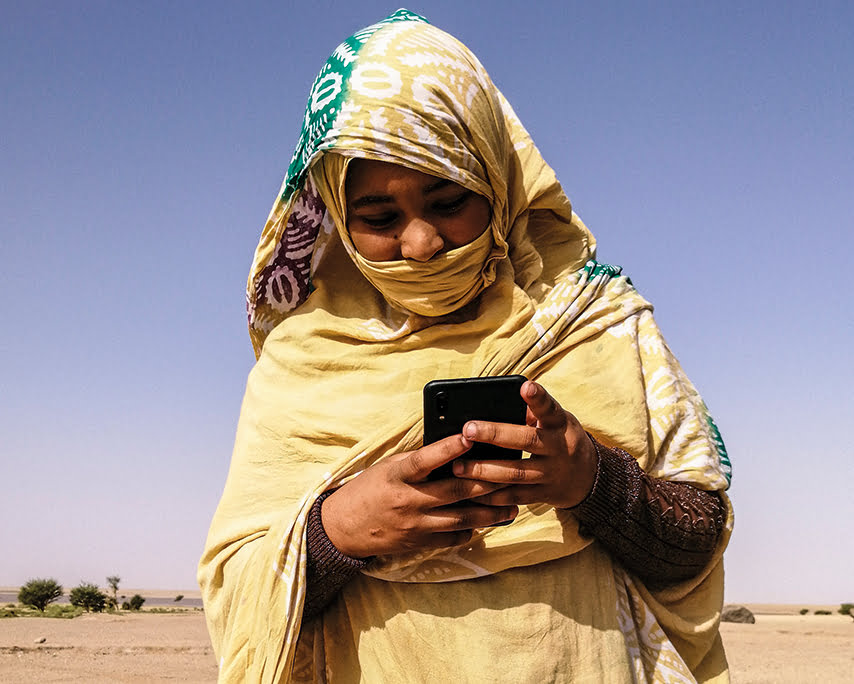Mauritania, Ben Amira, girl with smartphone.
Photo Credits: Giovanni Mereghetti/UCG/Universal Images Group via Getty Images
Navigating the Digital Frontier: Global Media and Information Literacy Week 2023
In an age where information reigns supreme, our capacity to discern between credible and unreliable information has never been more critical. In a world dominated by digital spaces and constant connectivity, the need for media and information literacy has reached an all-time high. It is in this context that the Global Media and Information Literacy Week 2023, with a special focus on digital spaces, seeks to guide us toward a brighter and more informed future.
A closer look at Global Media and Information Literacy Week
The Global Media and Information Literacy (MIL) Week, an initiative by UNESCO, is an annual event celebrated worldwide since 2012. This year, the event takes on even more significance as it zeroes in on the digital frontier. This year’s theme – Navigating the Digital Frontier – underscores the importance of digital platforms and other stakeholders in integrating media and information literacy into policies, operations and products. This theme acknowledges the vast impact digital spaces have on our daily lives and the information we consume.
Strengthening multilateral cooperation in digital spaces
MIL presents a unique opportunity to foster international collaboration among digital platforms, governments, educational institutions and civil society. Multilateral cooperation in the digital sphere is crucial for developing comprehensive strategies that promote media and information literacy. This involves sharing best practices, guidelines and frameworks to ensure a safer and more informed online environment.
The role of publishing houses in advancing media and information literacy
Publishing houses, as purveyors of knowledge and information, have a pivotal role to play in advancing media and information literacy in digital spaces. They are not just producers of content but also gatekeepers of credible information. Here’s five ways that they contribute to this important cause:
Promotion of credible content
Publishing houses must prioritise the publication of well-researched, fact-checked and unbiased content. By adhering to strict ethical and journalistic standards, they contribute to a more reliable information landscape.
Collaboration with educators
Publishing houses can collaborate with educational institutions to develop educational materials that promote media and information literacy. These resources help students and readers critically evaluate information sources and develop strong information literacy skills.
Fact-checking initiatives
Establishing fact-checking initiatives and platforms assists publishing houses in combating misinformation and disinformation. By verifying and disseminating accurate information, they actively participate in improving the overall media and information literacy environment.
Transparency in content production
Publishing houses should be transparent about their content production and editing processes. Readers should be aware of the steps taken to ensure the credibility of the information they consume.
Support for media literacy programmes
Investing in media literacy programmes within local communities and online helps publishing houses directly engage with the public and contribute to media and information literacy efforts.
Moving forward together
Global Media and Information Literacy Week is a clarion call for us all to strengthen our collective resolve in ensuring that digital spaces become safer and more informative. In the face of the ever-expanding digital world, we need to develop new initiatives and reinforce existing ones to advance media and information literacy. By doing so, we can foster a more discerning and empowered global community.
As we navigate the digital space, publishing houses, as stewards of information, must be active participants in this vital mission. By promoting credible content, collaborating with educators, and championing media literacy, they help pave the way for a future where individuals are better equipped to distinguish fact from fiction and navigate the digital landscape with confidence and discernment.
Global Media and Information Literacy Week is not just a week-long event; it is a rallying call for all stakeholders to work together and build a brighter, more informed future for our digital society.



